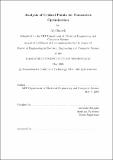Analysis of critical points for nonconvex optimization
Author(s)
Å imÅ ek, Alp
DownloadFull printable version (1.746Mb)
Other Contributors
Massachusetts Institute of Technology. Dept. of Electrical Engineering and Computer Science.
Advisor
Asuman Ozdaglar.
Terms of use
Metadata
Show full item recordAbstract
In this thesis, we establish sufficient conditions under which an optimization problem has a unique local optimum. Motivated by the practical need for establishing the uniqueness of the optimum in an optimization problem in fields such as global optimization, equilibrium analysis, and efficient algorithm design, we provide sufficient conditions that are not merely theoretical characterizations of uniqueness, but rather, given an optimization problem, can be checked algebraically. In our analysis we use results from two major mathematical disciplines. Using the mountain pass theory of variational analysis, we are able to establish the uniqueness of the local optimum for problems in which every stationary point of the objective function is a strict local minimum and the function satisfies certain boundary conditions on the constraint region. Using the index theory of differential topology, we are able to establish the uniqueness of the local optimum for problems in which every generalized stationary point (Karush-Kuhn-Tucker point) of the objective function is a strict local minimum and the function satisfies some non-degeneracy assumptions. The uniqueness results we establish using the mountain pass theory and the topological index theory are comparable but not identical. (cont.) Our results from the mountain pass analysis require the function to satisfy less strict structural assumptions such as weaker differentiability requirements, but more strict boundary conditions. In contrast, our results from the index theory require strong differentiability and non-degeneracy assumptions on the function, but treat the boundary and interior stationary points uniformly to assert the uniqueness of the optimum under weaker boundary conditions.
Description
Thesis (M. Eng.)--Massachusetts Institute of Technology, Dept. of Electrical Engineering and Computer Science, 2005. This electronic version was submitted by the student author. The certified thesis is available in the Institute Archives and Special Collections. Includes bibliographical references (leaves 121-125).
Date issued
2005Department
Massachusetts Institute of Technology. Department of Electrical Engineering and Computer SciencePublisher
Massachusetts Institute of Technology
Keywords
Electrical Engineering and Computer Science.